
Warhammer 40,000: Rogue Trader Review
When Warhammer 40,000: Rogue Trader was first announced by Owlcat Games back in 2022, I distinctly remember thinking "Well, that's too bad, I know absolutely nothing about Warhammer 40,000." It was a series and an IP, from my uninformed perspective, that released two or so very average games each year -- whose vibe and general aesthetic I never really latched onto. However, I had come to admire the aspirations and scope of Owlcat's previous two games (Pathfinder: Kingmaker and Pathfinder: Wrath of the Righteous), which also introduced me to the Pathfinder IP, so I knew that I would eventually be giving Rogue Trader a spin. I love CRPGs and turn-based games, so everything else about Rogue Trader was right up my alley.
Obvious to say, this review is admittedly coming in quite a bit belated. My experiences with both Kingmaker and Wrath of the Righteous were both incredibly marred by a huge number of technical and performance issues around launch, with those of Kingmaker being the worst I've ever formally reviewed. Based on a cursory reading of Steam forums, Reddit pages, and general social media reception, Rogue Trader was not an outlier in this regard either. Luckily, by waiting nearly 2/3's of a year, I was to be a beneficiary of two major patches, and while not flawless at this point, I found myself having a significantly better time compared to the previous efforts. For those yet to try it out, Rogue Trader is a lengthy, unique, and ambitious RPG for fans of the genre that I'm really glad I eventually made time for.
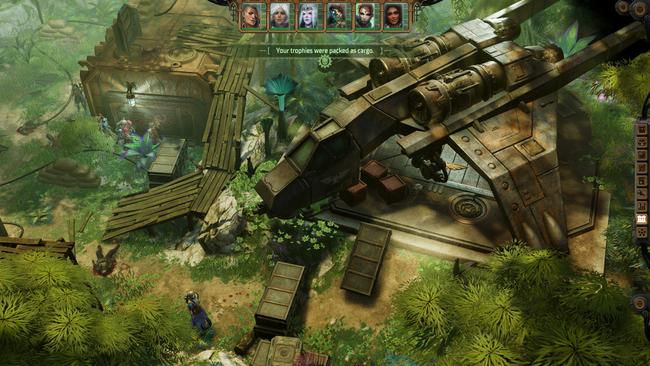
A little bit of a disclaimer to start -- I came into this game and this review with no prior Warhammer 40,000 history or knowledge. So my recollection of themes, places, events, world mythos, terminology, etc is as I understand them as presented by my 90-hour experience with Rogue Trader. However, since this is the first Warhammer 40,000 game of this type, I feel that others could conceivably be in a similar boat as me, so hopefully, that perspective is not uncommon.
Rogue Trader places the player in the role of the eponymous...Rogue Trader. The title is an incredibly high-standing one in the service of the human Imperium that is conferred by inheritance. As the name implies, this role is a sort of mega-broker or merchant, yes, but also gives whoever currently owns that title a huge protectorate consisting of dozens of vassals, several star systems, and thousands of people under their rule. The events of the game's prologue give the player the title passed down by Theodora von Valancius, who is the head of a large dynasty based out of a region known as the Koronus Expanse. She commands an ancient Voidship manned by a crew that has lived on it for generations. After her untimely death, the player is left to figure out what her goals were, learn why she was murdered, and deal with a handful of worlds-shaking events away from the Imperium.
In this way from a narrative perspective, Rogue Trader already positions itself slightly differently from many other RPGs in that the player-character is one of the two or three most important people in the game essentially right from the outset, and not due to anything related to prophecy or destiny. The main character simply knows and is related to the right people in a world that ultimately values that above all else.
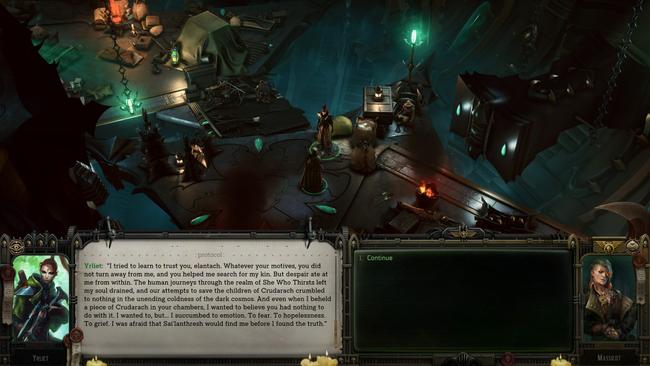
Many of the power dynamics and codes of morals in the Warhammer 40,000 universe are shaped around the existence of the Warp. "The Warp" is a sort of immaterial realm parallel to standard space that is both the source of all magic and psychic power, as well as the medium in which Voidships can achieve lightspeed travel. It's also where daemons come from. So in a way, people and societies that learn how to effectively navigate the Warp yet manage to mitigate unintended exposures to it are those that manage to seize and maintain power in the universe. As a very, very basic point of comparison, it could be considered similar to the Fade in the Dragon Age universe.
Rogue Trader does an exemplary job of really immersing the player in the rules and codes of the Warhammer 40,000 universe. This is really hammered home by the morality system (known as Convictions) in which, for example, being a Dogmatic follower of the human Imperium is called "Puritan", while being either a Chaos-serving Heretic or an Iconoclast to the established order are both deemed "Radical". Being a "good" person in this universe is very difficult and often unrewarding, though thankfully not impossible. There will often be a lot of resistance from multiple NPCs and even would-be allies for any action that dares to defy the Imperium.
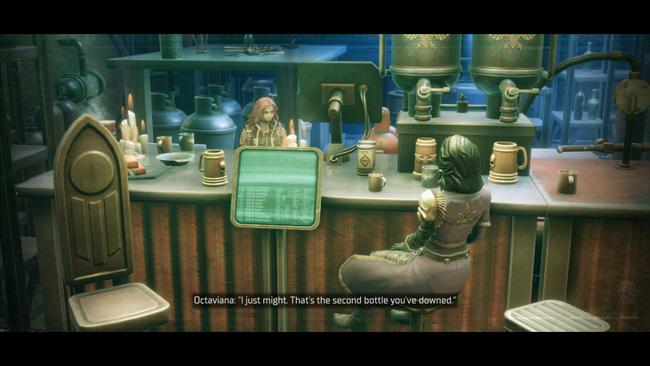
On a gameplay front, Owlcat has taken a tact not too dissimilar from Baldur's Gate 3 by opting for a pure turned-based gameplay style, instead of the hybrid options of turn-based or real-time-with-pause offered in Owlcat's previous games. While this originally worried me, since the turned-based mode (as detailed in my older review) was not a good fit at all in earlier games by the studio, it seems Owlcat has really smartly thought about their encounter design and combat systems in order to more naturally fit the turn-based gameplay in Rogue Trader. Enemy encounters are smaller in scope, with usually no more than 8-12 enemies present in any given battle. In addition to that, it's much quicker and slightly more possible to apply buffs and upgrade in battle prior to dealing damage. I remember one turned-based battle in Wrath of the Righteous taking nearly 40 minutes, whereas most encounters in Rogue Trader can be completed in around 10 minutes or less.
While exploration and battle are both shown from an isometric perspective, whenever a battle is initiated, a grid is superimposed on the environment to explicitly lay out where allies and enemies are positioned, what the weapon sightlines are, and a clear area of effect for weapons like shotguns or grenades. In some ways, a decent point of comparison might actually be something like Wasteland 3. Characters are given an allotment of both movement points and action points, and an explicit turn order is provided on the left of the screen. Most of the basic systems here are pretty well-worn, but everything works as it should, and I never found myself questioning how an ability worked, why I did or didn't have a line of site, or any other frustration of that nature. The only minor inconvenience that I did encounter was a few instances where enemy turns would infrequently hang for about 20 seconds in the back half of the game.
However, as in any good turn-based game, the player will steadily unlock different ways to manipulate the turn order. Whether it's an officer commanding an ally to "Bring It Down!" in order to grant some bonus actions, or a Bounty Hunter getting bonus turns with their unique Prey mechanic, the systems are set up to reward planning, strategizing, and execution. Up to six party members can be used in any combat environment, so players will naturally spend time in the first half of the game learning which characters they like and their general battle strategies, followed by executing them against more and more challenging encounters in the back half of the game.

One of the most unique aspects of the combat system in Rogue Trader is the very different approach it has to implementing a class-based system. While the game has a very clear class analog called Archetypes, this only tells part of the story. In character creation, you'll also select a Homeworld and an Origin. While other RPG systems might give small passive bonuses based on race selection such as a bonus or penalty to stats or a race-based feat, Rogue Trader implements the idea one step further. Effectively, the combination of a character's Homeworld, Origin, and Archetype holistically come together to create a bespoke "class" for that character. Many of the party members in the game even have unique Origins based on their role in the story, such as Jae's Cold Trader or Pasqal's Tech Priest.
For instance, becoming a Psyker -- effectively a mage -- in Rogue Trader is an Origin, not an archetype. An example Archetype would be Officer, a unit designed to buff their companions. A Psyker Officer would play much, much differently than a Noble Officer, despite the Archetype being the same. Homeworlds are the most passive selection made here, but even that selection can confer additional bonuses and up to five unique talents. Voidborns can get a passive talent to do additional damage on critical hits. Maybe a Voidborn Commissar Soldier would be a good combination. There are dozens of possible permutations.
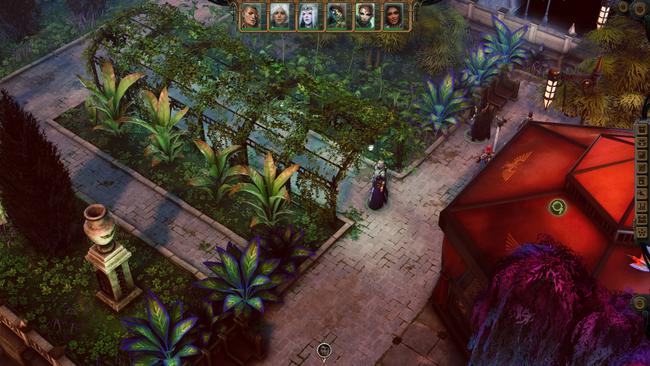
In addition to the core gameplay of exploration, character building, and combat, Owlcat often includes a number of other alternate gameplay sub-systems to interface within the context of the game. In Kingmaker, this was the town-building aspect, and in Wrath of the Righteous, this was everything around the map system and Crusades. In both of those games, I thought that the number of these alternate systems felt a little bit like bloat -- a very kitchen-sink approach that ultimately detracted from the enjoyment of the final game. In Rogue Trader, however, I felt that the number of systems to balance alongside the core gameplay elements felt a lot more manageable and naturally integrated.
Primarily, the level of wealth available to the Rogue Trader is too high to clearly quantify as a standard gold or currency amount. Instead, by doing quests and supporting the various people within their Protectorate, the Rogue Trader's wealth is represented by a number called Profit Factor. This basically means that anything at the current level of Profit Factor is within the Trader's means. In a few instances, Profit Factor can be reduced to provide goods and supplies as a sort of trade-off. In this way, it serves as a sort of macro-currency. By the end of the game, my Profit Factor was at about 170, which was high enough in order to "purchase" anything that vendors were willing to offer.
However, two additional systems come into play here, one that's a little more standard and one that's a bit more unique. Each vendor faction (of which there are five) will only trade the player weapons and supplies based on their current Reputation. While some reputation can be earned in game through quests and similar means, a lot of reputation is determined through providing Cargo to each vendor. Cargo is a system that is sort of like global storage present in other RPGs, though a little bit more disposable. Exploring each map, winning in space battles (more on that later), and designating unused gear as Cargo will fill a sort of pool of goods that can be traded in bulk in exchange for Reputation. Once a vendor's reputation with the player is high enough, and the player's Profit Level meets a certain threshold, they can purchase all the supplies at that tier for each vendor. The cargo system is really nice because it means that everything is worth exploring and picking up, because even basic gear that has long since been outclassed can be placed into cargo and exchanged.
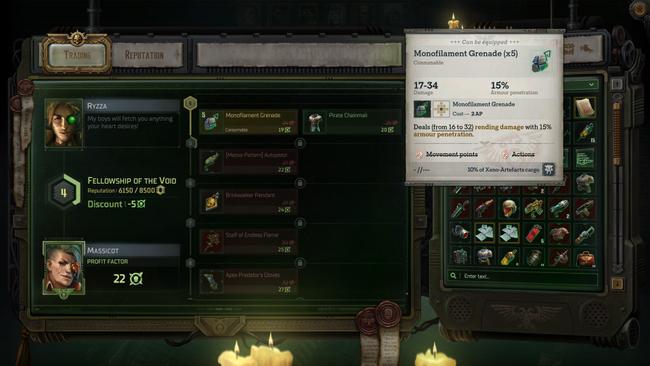
The gear that can be acquired in this way is a little bit more standard, but implemented well. Each character in the party has two weapon sets and a number of gear slots where they can equip items. Certain gear limitations exist based on feats and even Conviction levels, while also providing certain bonuses to attributes or traits inherent to the weapon. Different weapons also have different types of attacks available to them -- some are capable of burst fire, while others cause status effects, and so on. There are more unique pieces of gear in the game than there are places to equip them, so I was frequently exchanging weapons and armor and tweaking my party composition based on which gear I recently found or bought.
Nothing here will be altogether new to RPG veterans, except potentially the way that gear and weapon attributes interface with the aforementioned class combinations. There's enough variety here to really have a strong effect on playstyle, however. For instance, I spent the first 20 or so hours of the game without really having a good way to implement Burst Fire mechanics into my party setup, only later to rely on strong Burst Fire capable weapons as my primary source of damage from my strongest characters. If I played the game a second time, I'm sure I would come up with even more ways to unify the gear, class, and combat systems in a completely different way.
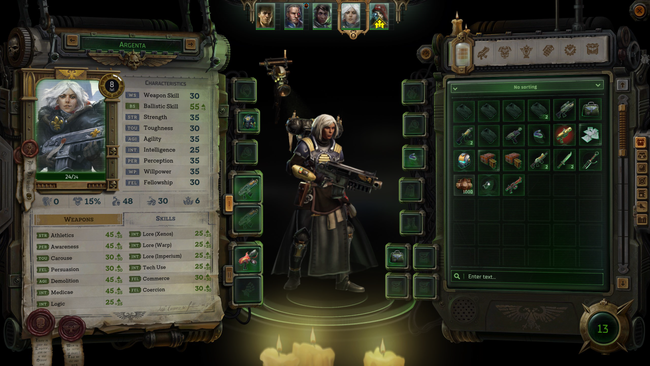
There is a small component of the game involving upgrading the Voidship, which serves as your home base of sorts, and engaging in ship-based encounters. While I was initially concerned that this would feel like a wholly new set of systems that would feel disjointed from the main gameplay elements, it ended up being largely a straightforward diversion that was present enough to shake up the gameplay without feeling too out of left field. Party members can be slotted into different roles on the ship, ship components can be bought and sold to upgrade 5 or so different weapon systems, and one of the vendors mentioned earlier even specializes in selling ship components.
Ship traversal in general is implemented in a way that feels sort of stressful, but I appreciated that it required me to think strategically about navigating the universal map. It also is a really intricate pairing of worldbuilding and gameplay, making the dangers of utilizing the Warp felt in a tangible way. The map is divided into nodes that the Voidship must travel between, with Routes that must be established by the ship's Navigator. During each warp travel, there's always a chance that the player will be asked to handle a breaching of the Warp veil and fight off some demons, or spend some supplies to help repair the ship after a particularly harrowing "jump". It makes traveling around each system feel a little bit more meaningful if also a little more inconvenient.
When traveling between each system, there's also a chance that the Voidship will run into pirates or raiders that have to be fought in ship combat. Luckily, the number of ship battles throughout my whole 80 hours of gameplay was maybe 20-25 or so in total. Enough to make it feel worthwhile to keep the ship upgraded and learn some tactics for implementing the ship-based abilities effectively without being too overly onerous. Thorough players will likely come across a number of strong upgrade components here through the natural course of gameplay to not really burden those who would rather focus on the standard battle encounters.
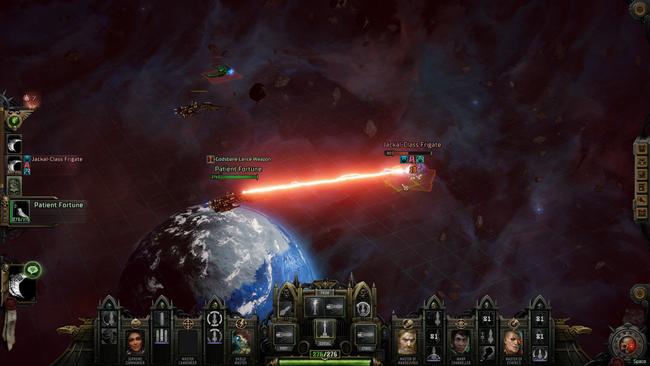
The one gameplay system that I felt most lukewarm on in Rogue Trader was that of the Colony system. As the Voidship travels from system to system, the Rogue Trader will eventually have access to 5 or so Colonies -- planets under their rule that serve as a sort of resource-management side activity. While some planets only serve as sources of materials, other planets will be able to undertake projects or deal with planet-wide events that can end up benefitting the player with replenishable consumables or passive buffs. To help visualize it, it's not too dissimilar from Mass Effect 2's planet scanning system.
This system is entirely menu-based, and largely separate from the main thrust of the game. While it doesn't involve too much playtime to keep on top of, it was difficult to gauge the impact or meaning of some of these Colony-based systems. By the second half of the game, the number of passive bonuses I was getting with each colony were too numerous to keep strong track of. I found myself clicking through the dialogue and options here just to be awarded dozens of stacking small passive bonuses when all of the colonies were considered together. In addition to that, the resulting consequences of each choice made in this system didn't feel like they interfaced with the rest of the game in significant ways most of the time (though I did get an allied ship to help me with space combat, which is cool). While most Colony management can be accessed anywhere from the world map, I would often get notifications that certain planets needed my input on an uprising, requiring me to travel back to each place to press a few buttons and be told in text that my actions were either helpful or not.
In general, it's still a better implementation of this sort of system compared to Owlcat's previous games, but I still don't feel that the game would lose much if the system were removed or even just significantly pared back.
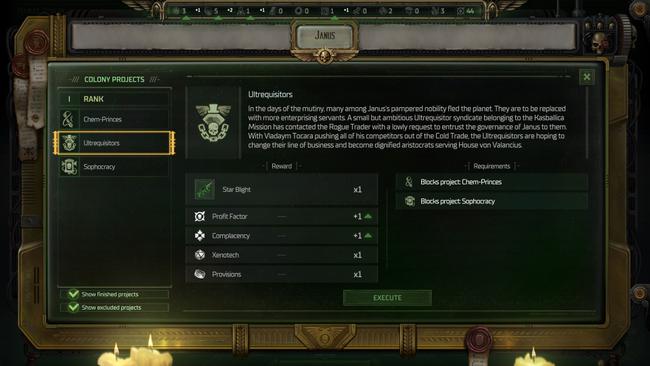
The characters present in Rogue Trader might be some of my favorites collectively, though no individual member reaches quite the heights of those like Arueshalae in Wrath of the Righteous. Highlights include the Tech-Priest Pasqal, who finds themselves investigating why they encounter so many other Tech-Priests that seem to share an identity with him, as well as Yrliet, an Asuryani alien who is incredibly distrustful of humans and finds themselves in the center of a pretty major moral quandary in the middle chapter of the game. Rogue Trader uses a pretty neat system where actions and decisions made in prior quests will show up in dialogue as blue text with a mouse-over tooltip, indicating to the player that a previous decision is affecting a party member's current behavior, or the outcome of a current quest objective.
For instance, I was told at one point that my Iconoclast demeanor had resulted in one of my party members becoming more merciful. Others became more trustful of xenos (aliens) despite the Dogmatic Imperium teachings. The game even plays with this system in fun ways to break the fourth wall in a tactful and meaningful way in the back part of the game. There are even multiple occasions where the player can defer a quest decision to a party member, which makes me curious to how a player's behavior might affect the outcome of these selections, based on their standing with that particular party member. The game will even give some indications of when a selection isn't available to the player because they don't have a particular Conviction, giving some indication of how events could turn out differently in another playthrough.
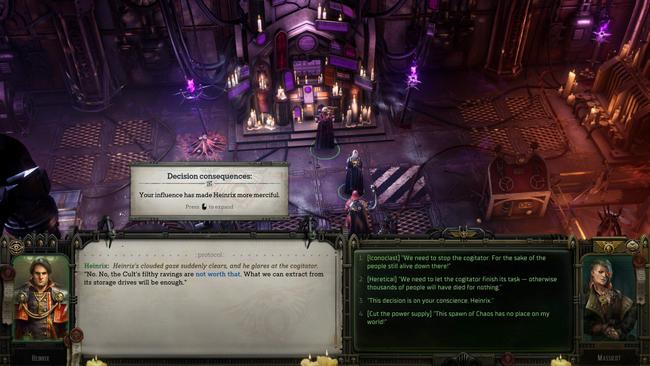
The pacing of Rogue Trader is strong in some ways and weak in others. The story opens with some hugely consequential events in the prologue and first chapter, followed by a wide-open Chapter 2, which ate up the majority of my playtime. Without spoiling anything, Chapter 3 then locks the player to a specific party composition without access to Colonies, Voidship, Cargo, or most of the previously mentioned gameplay systems. In a lot of ways, it's very similar to the Alushinyrra Act in Wrath of the Righteous, only without the camera gimmick, thankfully. IYKYK. I've also seen it compared unfavorably to the infamous "Fade" section of Dragon Age: Origins.
I personally quite enjoyed Chapter 3 once it was all said and done. By limiting the party selection and gear available to the player, it required me to adjust my approach, manage resources more carefully, and really immerse myself in the world-building and story of Warhammer 40,000 that I was still getting used to. For those who highly value a high degree of gameplay freedom, I can see why being limited in so many ways -- especially after the openness of Chapter 2 -- would be frustrating.
Personally, my frustrations didn't really manifest until the last two chapters of the game. Because the majority of the universe map is available in Chapter 2, I found myself without a lot of extra incentive to explore each system past that point. The later sections of the game feel significantly more on-rails, especially the final chapter. Thankfully, there are a number of strong companion-focused quests that become available in the late game that help prevent the final handful of hours from feeling hyper-linear, though I do think potentially limiting some of the star systems earlier in the game would serve as a good way to more level-load the experience front to back.
Lastly, I still encountered a small number of bugs and technical frustrations with the game despite waiting for some significant patches. Loading screens are still numerous and quite long, even on a fast SSD. Performance hitches were not uncommon, and the game was overall very taxing on my PC setup. In-game, I would have some issues with certain NPCs not responding to conversation prompts, and often would have Rumours (a type of subquest) remain in my quest log long after I had already resolved whatever item or location they were hinting at. A few NPCs would re-animate after dying and just stand in place for the rest of my game time.
None of these were game-breaking, but it is more reminiscent of typical game launch status than one that's been significantly touched up already. A glance at the game's forums (Reddit, Steam, etc) only slightly reveal the even worse state that the later game chapters were in closer to launch.

While the gameplay progression is a little uneven, I found myself really impressed by the story progression once I hit the game's credits. The early game starts off with some very impactful events, while the middle chapters of the game slow down to allow the player to meet the different races and beliefs of the 40K universe, while introducing a number of unique companions and locations, including their individual storylines. In the middle of my playtime, I found myself wondering and not 100% sure of who the main antagonist was, and even once it became clear, their motivations and goals were still a bit of a mystery. The last chapter of Rogue Trader does an excellent job of tying together loose threads (that didn't feel like loose threads at the time) and really resulted in the whole pacing of the story feeling cohesive and complete without feeling overly contrived.
There are enough revelations in the back section of the game that really make me eager to, at some point, replay the title to see how they recontextualize earlier events. With a seemingly significant amount of post-game updates and DLC planned for the title, it might make for a good excuse to revisit Rogue Trader in a year's time or so.
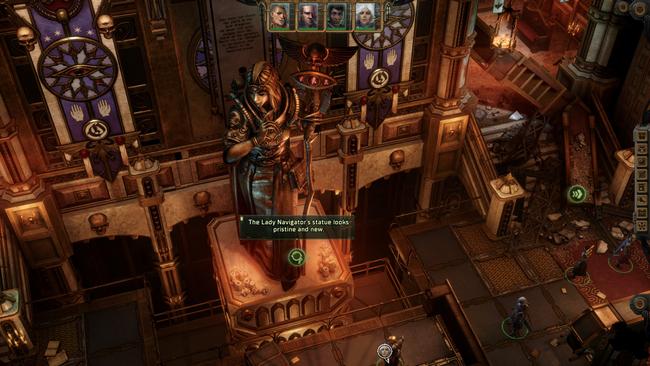
Despite my unearned misgivings at the game's initial announcement, Warhammer 40,000: Rogue Trader somehow became likely my favorite title so far from Owlcat Games. Likely due to a combination of well-designed turned-based gameplay, a better focus of gameplay systems that don't needlessly detract from the core experience, and simply waiting for a few additional layers of polish to give the title a chance to be represented in the best manner possible. While still a little uneven in terms of gameplay progression and technical proficiency, Warhammer 40,000: Rogue Trader is an engaging game that's brimming with things to discover and a uniquely compelling narrative that is at times both hopeful and poignant.